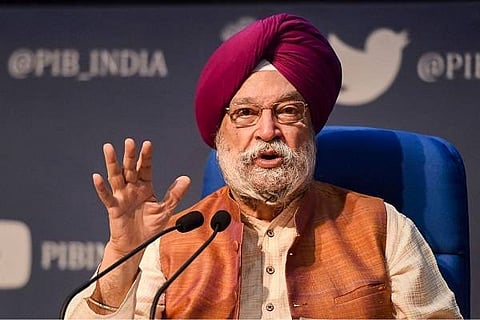
- News Updates
- PSU Watch
- Defence News
- Policy Watch
- हिन्दी न्यूज़
- Jobs Watch
- States News
- Event News

New Delhi: Minister for Petroleum and Natural Gas Hardeep Singh Puri has defended the high level of taxes levied on fuels — petrol and diesel — by the Centre in the form of central excise duty by saying that the revenue generated is being used by the government to provide free COVID-19 vaccines and for various developmental schemes. While responding to a question in the Lok Sabha, Puri refused to acknowledge the inflationary pressure created by the high fuel prices on the economy by saying that the weightage of petrol, diesel and LPG in the WPI index is 1.60 percent, 3.10 percent and 0.64 percent, indicating that petroleum products may not be responsible for rising prices in other categories.
The statement assumes significance as it comes in the backdrop of fuel prices breaching the Rs 100-per-litre mark in several locations states across the country. The prices of petrol and diesel have touched a record high primarily because of the rise in global crude oil prices and the large number of Central and state tax levies, which make up around 60 percent of the retail fuel prices.
Responding to a question on the impact of rising fuel prices on the country's economic recovery from the Covid-19 pandemic in the Lok Sabha, Puri said that the revenue generated by taxation on petroleum products is used in various developmental schemes of the government like Pradhan Mantri Gram Sadak Yojana (PMGSY), Pradhan Mantri Ujjawala Yojana (PMUY), Ayushman Bharat, Pradhan Mantri Garib Kalyan Yojana (PMGKY) and to provide relief to the poor during the pandemic by schemes like Pradhan Mantri Garib Kalyan Anna Yojana (PMGKAY) under which free ration was provided to 80 crore beneficiaries between April 2020 and November 2020 and May-June 2021, and for providing free vaccination against Covid-19 etc.
The minister also said that over the last seven years, length of National Highways has gone up by 50 percent from 91,287 km (as of April 2014) to 1,37,625 km (as on 20 March 2021). Highway construction per day in India increased almost three times from 12 km/day in 2014-15 to 33.7 km/day in 2020-21. Puri added that the revenue generated by the taxes is used for infrastructure development and generating employment.
The government's tax mop-up from petrol and diesel rose by 88 percent in FY21 year-on-year as it raked up Rs 3,34,894 crore as opposed to Rs 1,78,311 crore in FY20, Lok Sabha was told a week back. The reason behind the big jump in revenue collection is the rise in central excise duty levied by the government on petrol and diesel. The central excise duty on petrol has been raised from Rs 17.46 per litre in 2015 to Rs 32.90 per litre, while that on diesel has been raised from Rs 10.26 per litre in 2015 to Rs 31.80 per litre.
(PSU Watch– India's Business News centre that places the spotlight on PSUs, Bureaucracy, Defence and Public Policy is now on Google News. Click here to follow. Also, join PSU Watch Channel in your Telegram. You may also follow us on Twitter here and stay updated.)
